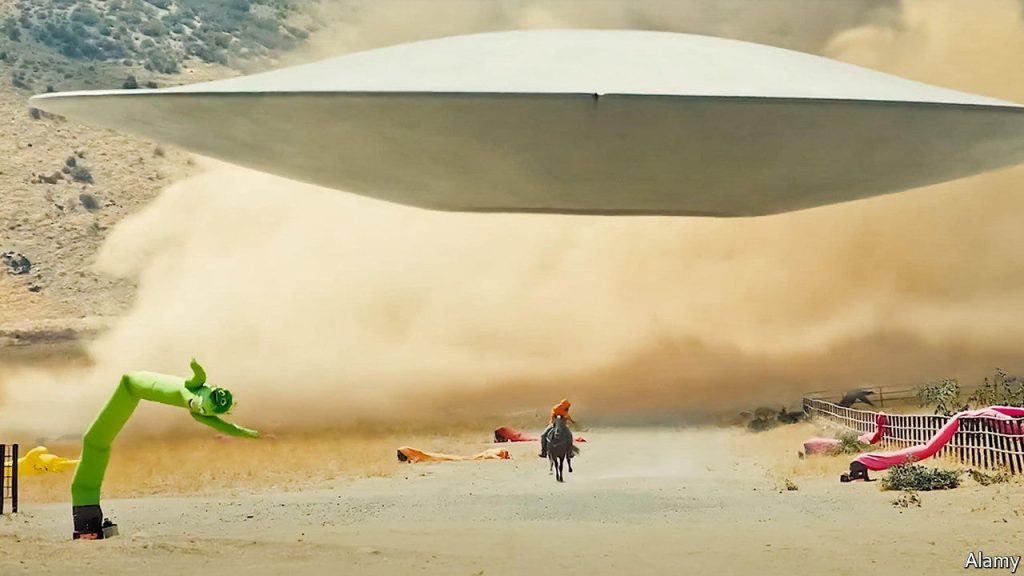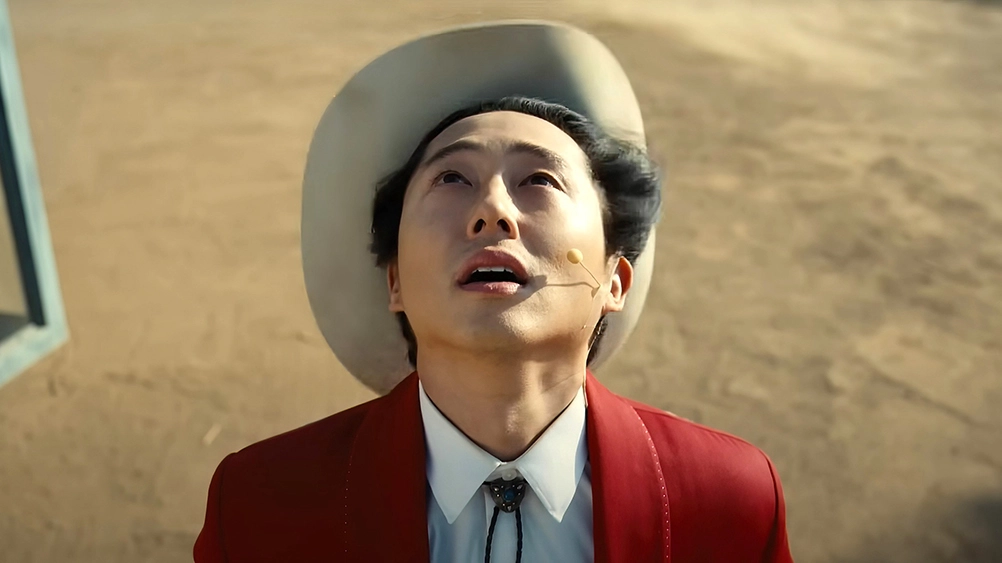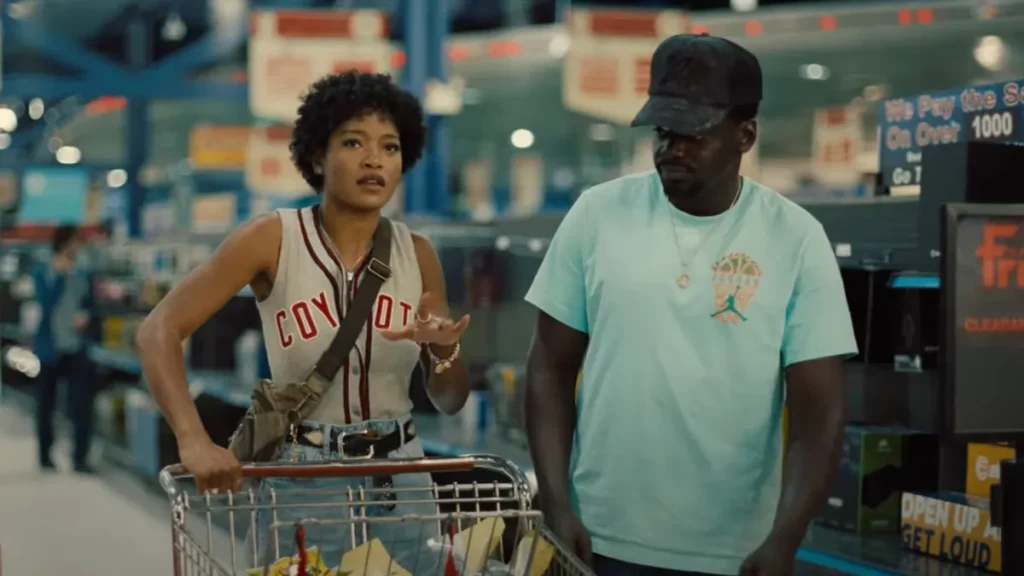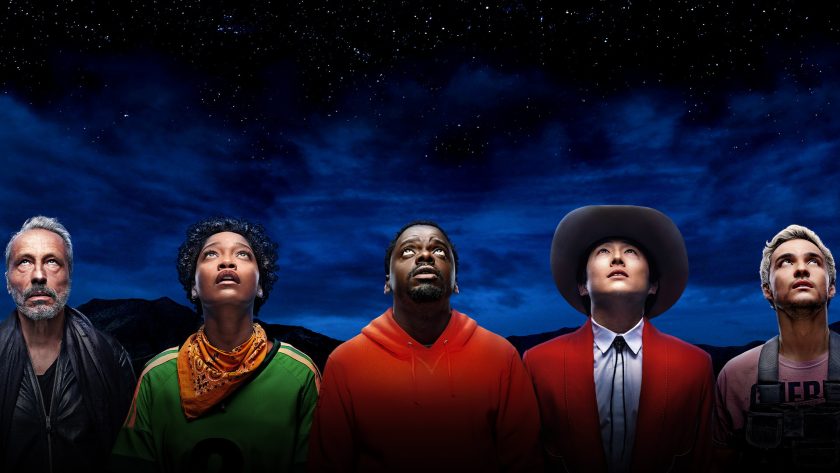Lavanya Nayar reviews Jordan Peele’s American neo-Western science fiction horror film, starring Daniel Kaluuya, Keke Palmer, and Steven Yeun.
Jordan Peele’s highly-anticipated Nope is an eclectic mix of genres and stories, asserting the director’s ambition to tie his work in with both the history and current evolution of cinema. Resorting again to the original storytelling and poignant criticism that had left the audiences of Get Out and Us in awe, Jordan Peele has however decided to break away from his signature deeply political rhetoric to focus his discourse on everything-filmmaking. Despite the result being sometimes sloppy, deconstructed and unimaginative, Nope’s worth lies in its use of self-depreciating humour to divert from the elongated expectations built up throughout the movie.

Although the movie opens with an ominous biblical quote from Nahum 3:6: ‘I will cast abominable filth upon you, make you vile and make you a spectacle’, followed by a scene of monstrous savagery on the set of a sitcom, the main plot is actually far less atrocious. OJ (Daniel Kaluuya) and his sister Emerald (Keke Palmer) inherit the Haywood ranch, which provides horses for TV productions, after their father Otis (Keith David) is mysteriously killed in an accident. As they proceed to sell their stock to Ricky ‘Jupe’ Park (Steve Yeun), the owner of a nearby theme park and the unfortunate starchild of the above-mentioned tragedy, they start witnessing supernatural events and the presence of an UFO. With the help of salesman Angel Torres (Brandon Perea), they decide to film the outer space creature(s) and monetise the footage.
As they take the camera in their own hands, the trio, later joined by Antler Holst (Michael Wincott), set themselves on a quest to fulfil the fantasy of every director: filming the impossible, capturing an image of what has never been recorded before, catching the ‘Oprah shot’. The movie is thus burgeoning with cameras and film references, from security cameras, phones and even a hand-cranked camera to the mention of a hereditary link between the Haywood family and the unnamed jockey shot by Muybridge, late 19th-century precursor of motion-picture projection. Peele also actively participates in his characters’ game, and presents us with spectacular, Imax-friendly scenes of an ethereal midwestern valley, stellar nights and feral animals. Particularly admirable is the solid accuracy with which he depicts and alludes to tri-dimensional, acoustic and extraterrestrial spaces.

Another way for Jordan Peele to demonstrate his mastery of the cinema glossary is to use and reinvent the canons of film genres, in the same vein as Get Out. Nope is therefore a patchwork of science fiction, horror, western, documentary, sitcoms, Japanese animation, thriller and comedy, sprinkled with explicit references to Spielberg’s Jaws and Close Encounters of the Third Kind. However, whereas the ‘neo-western’ aspect of the film is succesfully encapsulated by the choice of modern streetwear costumes – Carhart hats and RipNdip trousers – Jordan Peele’s addition to the state-of-the art is quite uneven. The movie is indeed also disappointingly full of cheap thrills.
Furthermore, all those thematic links and cross-references lack coherence and detract from Peele’s usually skilfull storytelling. The movie is fairly long and its fractured structure seems to be devised only to mask the simplicity of the plot. What was the point of insinuating paranormal activity through the standing shoe? Is there any concrete link between Gordy’s side-story and the supernatural phenomena occurring at the Haywood ranch apart from the fact that Ricky Park stars in both? Leaving the audience with these open-ended, unsatiated questions almost conveys the impression that Peele is lazily putting the onus on the viewer to make up a meaning out of this scrambled food for thought.

Yet, Jordan Peele wittily manages to manipulate the codes of blockbuster to create a true piece of entertainment. The movie is bursting with electric scenes of rising actions and comic turnarounds, such as the running gag of characters recognising their ineptitude in the face of adversity and simply uttering ‘nope’ in an attempt to avoid the worst. Moreover, behind the film’s clumsiness (or intentional cynicism towards filmmaking) lies somewhat of a moral. As evidenced by the identical yet diametrically opposed fates of Antlers Holst and the TMZ journalist, Peele crudely criticises the irresponsible communication of viral images on social media platforms. The movie’s denounciation of animal exploitation and the purposeful aspetisation of characters who only seek fame (which, on a side-note, did not prevent Kaluuya from delivering another remarkable performance) hints at the director’s impetus to advocate for mutual respect between the individuals, or beings, on both sides of the camera.
Nope may not live up to the success of Get Out and Us, but it is definitely worth seeing and nope, it does not dethrone Jordan Peele from his title of up-and-coming master of the art.
Watch the trailer for Nope here:




